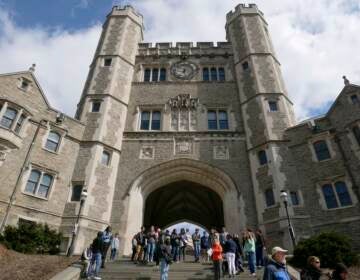Court hears Bacon v. NJ DOE, rural school districts seeking Abbott-style funding
The same day last week that acting Education Commissioner David Hespe was in the Statehouse for his confirmation hearing, another weighty discussion was taking place less than a mile away in a Trenton courtroom on a matter that could prove pivotal in its own right.
State Superior Court Judge Mary Jacobson held oral arguments on Bacon v. N.J. Department of Education, the long-running complaint that has been the rural version of the Abbott v. Burke equity rulings for the state’s urban districts.
Dating back almost two decades, the legal action involves 16 low-income towns from mostly South Jersey — from Buena to Lakewood — that have sued the state for underfunding their schools by as much as $20 million this year. The districts have effectively sought to win the same legal protections and benefits that the Abbott rulings afforded urban districts like Newark and Paterson.
The hearing last Thursday in Mercer County Court — held two hours before Hespe’s confirmation hearing — was about a motion to enforce a 2008 appellate court ruling that demanded additional funding for the districts to meet their constitutional right for a “thorough and efficient” education.
Under former Gov. Jon Corzine, the state complied for a year with the enactment of the School Funding Reform Act, but it pulled back when Gov. Chris Christie made steep cuts in state aid to schools in 2010.
While relatively technical, the arguments on Thursday often turned on Christie’s overall record in funding — or under-funding — the state’s finance law, and its constitutional implications against the backdrop of Abbott.
One notable exchange came when Jacobson questioned Donna Arons, the deputy attorney general, over how the state specifically stepped away from funding expanded preschool in the 16 Bacon districts three years ago. Preschool education for 3- and 4-year-olds is one of the centerpieces of the case, as it was in Abbott. An estimated 2,000 students would be affected.
Arons said it was a matter of affordability in the face of the recession. “We would all like preschool, but there are funding constraints,” she said at one point.
But Jacobson interrupted: “Funding constraints? That doesn’t trump the constitution. That was what Abbott was all about.”
Still, the questioning wasn’t much lighter on the Bacon districts’ lawyer. Arguing for the plaintiffs was David Sciarra, the director of the Education Law Center, the Newark-based organization that has been the spearhead in the Abbott litigations since the 1970s.
Jacobson quizzed Sciarra on whether the state’s “needs assessments” of each of the Bacon districts back in 2009 still applied.
“You are asking me to enforce documents from 2009,” Jacobson said. “The problem I have is these seem to so outdated.”
Sciarra responded that these were the state’s own assessments for the districts, coming with the expectation that they would be funded. “There was a determination that the state would continue to provide at these levels,” he said.
He said the responsibility rests on the state to meet the mandates: “The burden is on the state [to meet] the fundamental rights of these students to a thorough and efficient education.”
“They started the remedy, and then abandoned it,” Sciarra said. “They sat on the side and did nothing, forcing us to now come to you. These kids have waited 18 years since the case was first filed, waited eight years since the court upheld it, and waited three years since the state basically stopped.”
Arons in representing administration said the matter before the court was a “narrow” one of whether the state was in violation of an order from five years ago. She argued there was no determination that any constitutional violation still existed, even with reduced funding.
“Who knew then we would have a financial crisis and SFRA couldn’t be fully funded?” she said.
Jacobson did not give a timeframe for when her ruling would be issued.
________________________________________________
NJ Spotlight, an independent online news service on issues critical to New Jersey, makes its in-depth reporting available to NewsWorks.
WHYY is your source for fact-based, in-depth journalism and information. As a nonprofit organization, we rely on financial support from readers like you. Please give today.









